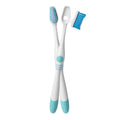Selecting the perfect toothbrush is crucial for maintaining optimal oral hygiene. The first decision to make is whether to opt for a manual or electric toothbrush. Manual toothbrushes offer simplicity, affordability, and complete control over brushing technique, making them accessible to all. On the other hand, electric toothbrushes provide efficiency and built-in features like timers and pressure sensors for a more effective cleaning experience. Consider your preferences, budget, and specific oral health needs when choosing between the two.
Once you've decided on the type of toothbrush, it's important to consider the bristle type. Soft bristles are recommended by dentists as they effectively clean teeth without causing damage to enamel or gums. Medium or hard bristles may be too abrasive and lead to gum recession or enamel erosion. Choose soft bristles to ensure a gentle yet thorough clean.
Next, pay attention to the size and shape of the toothbrush head. Opt for a head size that comfortably fits your mouth and allows you to access all areas, including the back teeth and along the gumline. A smaller, compact head with rounded bristles is ideal for reaching tight spaces and ensuring thorough cleaning.
Look for toothbrushes that have earned the American Dental Association (ADA) Seal of Approval. This certification indicates that the toothbrush meets rigorous safety and efficacy standards, providing assurance of its quality and performance. Consider additional features such as timers, pressure sensors, and brushing modes (e.g., sensitive, whitening) to enhance the brushing experience and promote better oral hygiene habits.
Take into account any personal preferences or specific dental conditions when choosing a toothbrush. Factors such as sensitivity, orthodontic appliances, or gum disease may require a specialized toothbrush with extra soft bristles or specialized cleaning modes. Consult with your dentist or dental hygienist for personalized recommendations based on your oral health needs.
Remember to replace your toothbrush regularly to maintain optimal cleaning efficacy and prevent bacterial buildup. Dentists recommend replacing your toothbrush every three to four months or sooner if the bristles become frayed or worn out. By considering these factors, you can select a toothbrush that effectively cleans your teeth and promotes a healthy smile.
In conclusion, choosing the right toothbrush is essential for achieving and maintaining good oral health. By considering factors such as manual vs. electric, bristle type, size and shape, ADA approval, special features, and personal preferences, you can make an informed decision that supports your oral hygiene routine effectively.


